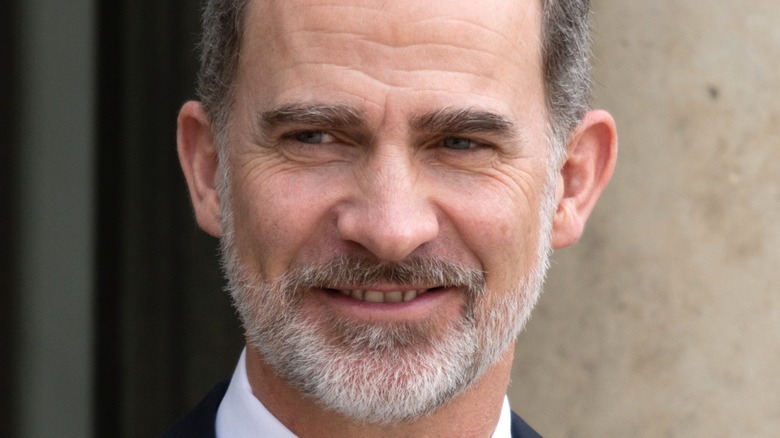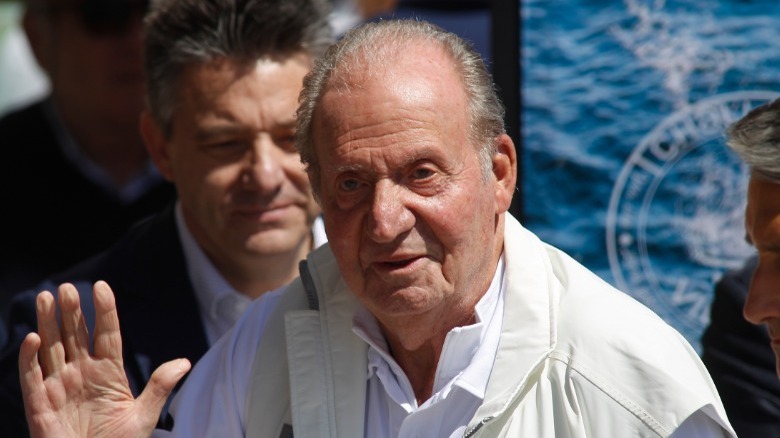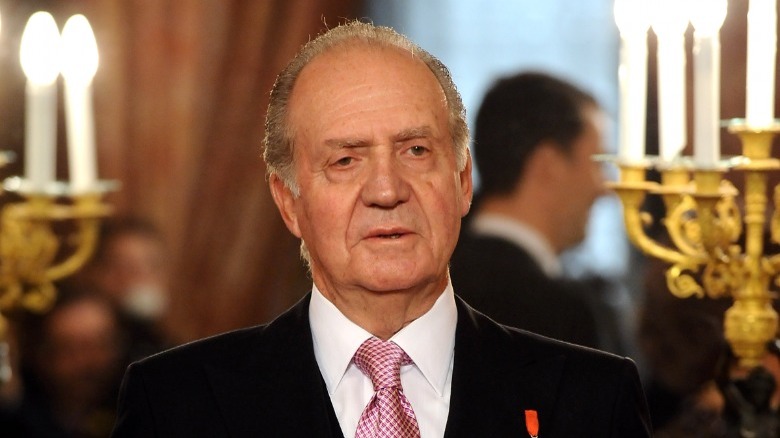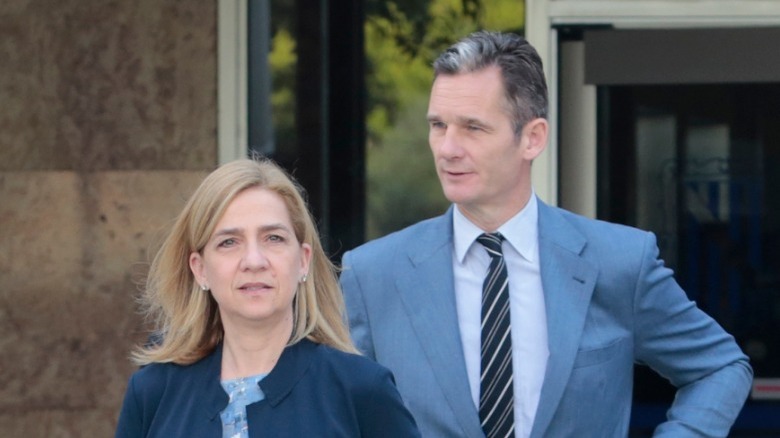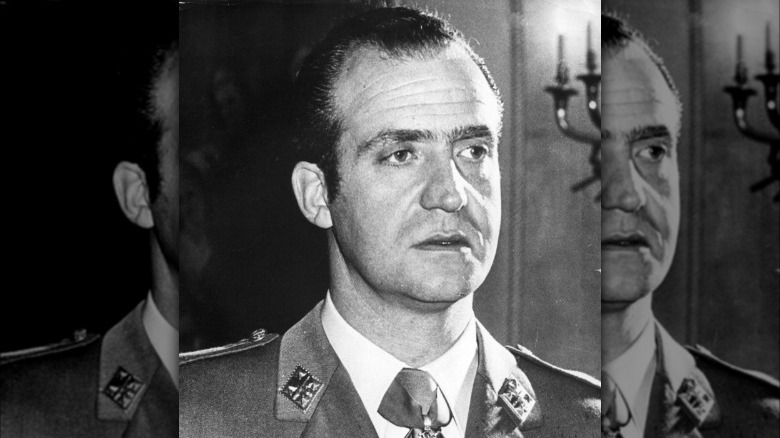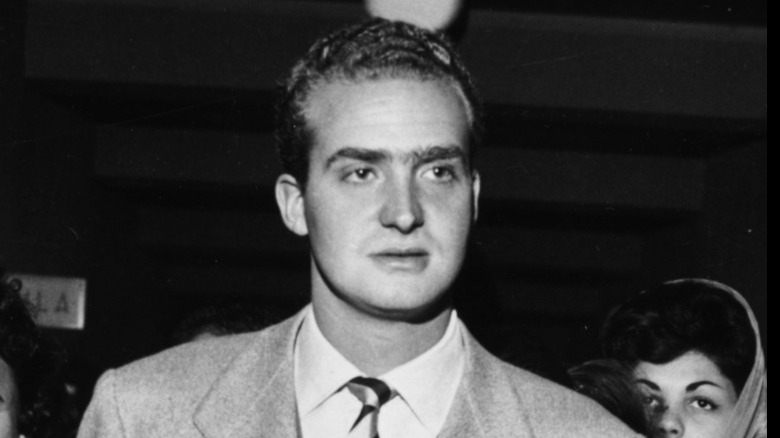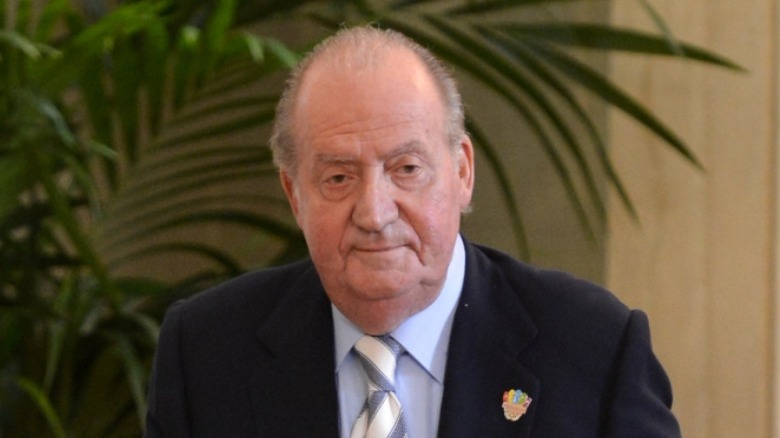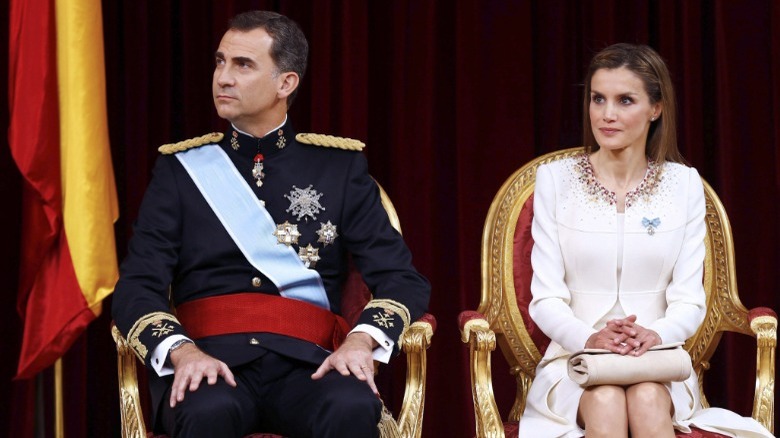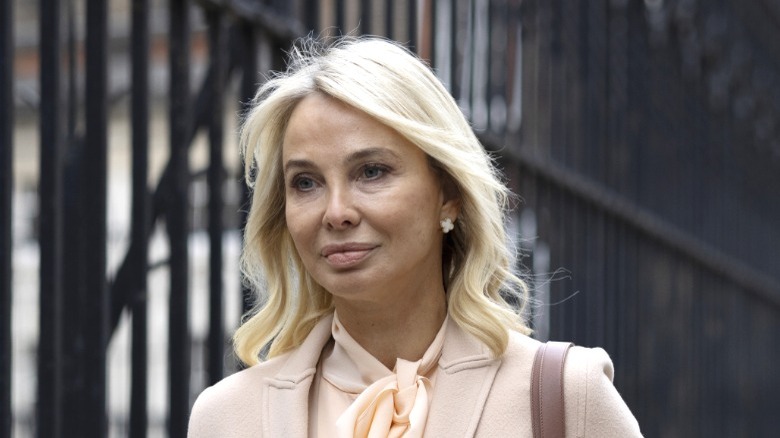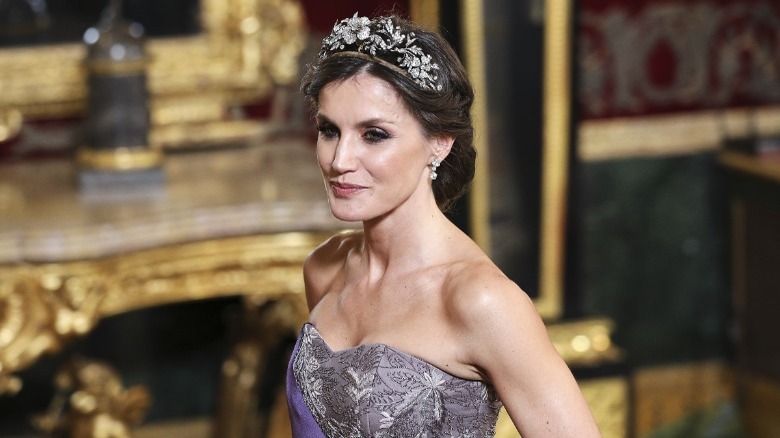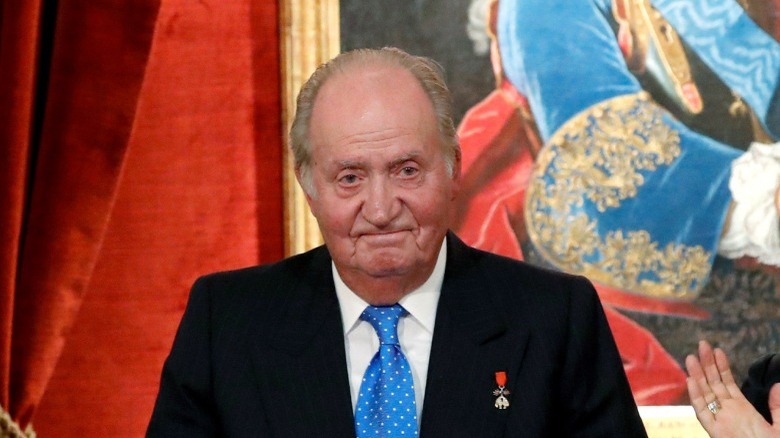The Biggest Skeletons In The Spanish Royal Family's Closet
Spain is the last Spanish-speaking country in the world to have a monarchy, with a royal history that dates back to the 16th century. However, the monarchy was dissolved in 1931 which led to a voluntary exile of the royal family. That is, until 1975, when the Spanish throne was re-established and Juan Carlos I was crowned Spain's new king.
For many decades, King Juan Carlos and his family enjoyed high approval ratings and he was viewed as the ruler who reinvented Spain after a decades-long dictatorship and who ushered the nation into a new era. But in recent years a string of royal scandals caused the public approval of the monarchy to drop significantly and now 40% of Spain favors re-establishing a republic, according to Reuters. Since Juan Carlos's abdication in 2014, his son King Felipe VI has worked to regain the trust of the public.
For many years, a "pact of silence" between the royal family and the Spanish media prevented details of their personal lives from being scrutinized, but over the course of the past ten years, that pact has lost its power and some less than savory facts have come to light. Let's take a closer look at the biggest skeletons in the Spanish royal family's closet.
King Juan Carlos I was hunting an endangered species
2012 was the beginning of a new wave of disapproval of the monarchy from the people of Spain. That year King Juan Carlos I took a hunting secret trip to Botswana. When the King broke his hip during the trip and had to receive emergency care, all was revealed to the public and that former "the pact of silence" was broken by the media, according to Time. It was reported that King Juan Carlos was not only with a mistress on the vacation but he had been hunting elephants, an endangered species. At the time Juan Carlos was the honorary president of Spain's World Wildlife Fund, though the WWF was quick to react to the public outrage by stripping him of the title. "Although this type of hunting is legal and regulated, many members consider it to be incompatible with the position of honorary patron of an international organization that aims to protect the environment," WWF said in a statement (via the BBC).
Reportedly the trip cost around $60,000, according to Business Insider. Citizens felt this was proof that the royal family was out of touch with reality. At the time unemployment numbers were high and the economy was suffering. The former king apologized, saying, "I am very sorry. I made a mistake. It won't happen again." But the episode began to sow the seeds of doubt in the public.
The king's boat got him in trouble with taxpayers
After the elephant incident, King Juan Carlos I was subjected to more scrutiny than ever before and it came to light that the king had spent an exorbitant amount of money on his yacht, much to the dismay of taxpayers. As mentioned above, Spain was going through some economic hardship in the early 2010s, so when the king was galavanting around the world on safaris and spending time on his expensive yacht, the unrest amongst Spanish civilians continued to increase as they began to wonder if their taxes were being used efficiently. One citizen told NPR, "I'm totally against it...because why should I pay for their food, their clothes, their jewelry? I don't want to pay them."
As disapproving of the royal family's opulent lifestyle became the growing consensus, Juan Carlos decided to give up the $27 million yacht. But this "gesture of frugality," as The Guardian called it, turned into another scandal when the crew of the ship claimed they were illegally dismissed and sued for over $1 million. During court proceedings, it was revealed that the captain of the yacht had been earning more than the prime minister. It became clear the king's priorities differed from that of the public.
Infanta Cristina's involvement in tax fraud and embezzlement
In 2016, Infanta Cristina, Juan Carlos I's daughter and Felipe VI's sister, became the first member of the Spanish royal family to face criminal charges as she became entangled in her husband's embezzlement and tax fraud schemes, according to The Guardian. Her husband, Iñaki Urdangarin, was embezzling money from his nonprofit, the Noos Foundation, to avoid taxes, per Reuters. It was revealed the embezzled money had been used for family vacations and home renovations.
The Spanish princess was tried for potential involvement in the scheme and though ultimately acquitted she did have to pay a hefty €265,000 fine for benefitting from the laundered money, according to The Guardian. Her husband, however, did not get off so easily. He was sentenced to six years in prison, and the Duke and Duchess of Palma de Mallorca were both stripped of their titles. This scandal only deepened distrust of the royal family.
The former king allegedly had 5,000 affairs
It has long been rumored that King Juan Carlos I had his fair share of extramarital affairs during his reign, but just to what extent is hard to say. It's been reported the monarch had thousands of trysts in his lifetime, which was explained in greater detail in the book "Juan Carlos: The King of 5,000 Lovers" by Martinez Ingles, a military historian and essayist. Per the Daily Mail, the author claims it is the "true story of an amoral king, unscrupulous, shameless, ambitious, authoritarian, authentic sexual predator." The book unpacks tales of his supposed affairs, like the time he allegedly hit on Princess Diana or paid a Miss World contestant $2.5 million to keep her relations with him a secret. According to The Sun, that money came from taxpayers.
Apparently Juan Carlos's affairs were seen as a major problem by the government. In 2021, The Times reported that former police commissioner José Manuel Villarejo claimed that the Spanish Secret Service injected Juan Carlos with female hormones and testosterone inhibitors to try to curb his sex drive. Villarejo, who was being tried for corruption, made the allegation during a parliamentary hearing. None of this, however, has ever been confirmed.
Juan Carlos I was responsible for the accidental death of his brother
As mentioned previously, the Spanish royal family had been in exile since 1931. Accordingly Juan Carlos grew up partly in Rome and Switzerland before his family relocated and settled into Portugal, according to the Independent. Juan Carlos was 18 when a terrible tragedy struck the family. "While His Highness the Prince Alfonso was cleaning a revolver with his brother, a shot went off which hit him in the forehead and killed him within a few minutes," an official statement read at the time. Juan Carlos allegedly had always said he "felt responsible" for the accident.
New details emerged about the death when HBO released the documentary "Saving the King." In it, the journalist Luis Maria Anson explained, "When the brother came up and pushed open the door, Juan Carlos, who was holding the pistol, stepped back and the pistol went off. The bullet entered the boy here [pointing to his head] and came out here. It lodged in the doorway...The boy was dead, nothing could be done." Antonio Eraso, childhood friend of King Juan Carlos added, "I was one of the first to arrive. His father demanded, on the spot, that he swear on the flag of Spain that he didn't do it on purpose." According to the documentary, the monarch was haunted by the accident for the rest of his life.
Back into exile for Juan Carlos
Juan Carlos was born in exile and at 82, returned to exile. In 2020, the ex-king who had abdicated his throne to his son Felipe VI decided to leave the country after corruption allegations spurned when reports came out that the former king was under investigation for money laundering, per the New York Post. In a letter to his son (via CNN), the former monarch explained his disappearance, saying, "In the face of the public repercussion that certain past events of my private life are generating, I wish to express to you my utmost availability to contribute the facilitation of the execution of your functions, from the tranquility that requires your position of high responsibility. ... Now, guided by the conviction to perform the best service to the Spanish people, their institutions and you as King, I am communicating my thoughtful decision to move, at this time, outside of Spain." He clearly knew his endless scandals were degrading the crown and preventing his son from preserving the monarchy.
Two years later, in 2022, the investigations were dropped when the prosecutor noted that even if he could prove the allegations (which he apparently couldn't) "Juan Carlos would have had constitutional immunity as a monarch at the time," according to Reuters. With the case dropped and two years of silence from the former king, he was able to return to his home country and be close to his family once again.
King Felipe VI and Queen Letizia's alleged link to a corrupt banker
Try as they might, but the Spanish royal family can't seem to stay away from money scandals. In 2017, King Felipe VI and Queen Letizia were connected to a banking scandal after a text message conversation was leaked. When Javier Lopez Madrid, a banker friend of the royal couple, was accused of misusing funds and abusing corporate credit cards, Queen Letizia sent a text of sympathy and the king also responded in the thread, per the Daily Mail. According to The Guardian, the queen's message said, "I wrote to you when the story on the credit cards came out...We know who you are and you know who we are. We know each other, like each other, respect each other. To hell with the rest. Kisses yoga mate (miss you!!!)." The banker friend (and apparently the queen's yoga buddy) said, "In future I will take extra precautions, we live in a very difficult country and I will be even more aware of my conduct." The king then responded, "We do indeed!"
The interaction drew criticism from the public and was the number one trending topic on Twitter in Spain shortly after it was leaked. Reportedly, the royal family didn't deny that the texts were real and an anonymous spokesman for the palace told the press that the king had ended his friendship with the banker, adding, "The king doesn't directly explicitly support him."
Was Corinna zu Sayn-Wittgenstein ruthlessly spied on?
Juan Carlos I's extramarital relationship with Corinna zu Sayn-Wittgenstein was rumored for years though the press had never officially reported on it due to the aforementioned "pact of silence." However, when the king at the time was hurt in a hunting accident in Botswana and it was revealed that Sayn-Wittgenstein was accompanying him, it became apparent to the public that the Danish businesswoman was, in fact, a mistress of the king. According to the BBC, she was in a relationship with the monarch from 1975 to 2014. She claims, however, that ever since the Botswana incident she has been spied on by government officials and harassed by the monarchy.
She was allegedly surveilled constantly and blamed a home break-in on spies. "Following the Botswana trip and from conversations with the King Emeritus [Juan Carlos] and his entourage, it became clear to me that I was being perceived not only as persona non grata but also as a threat to the Royal Family," she explained in an affidavit (via the BBC). According to the Daily Mail, after she and Juan Carlos broke up, he demanded she return €65 million he had given her as a gift, a sum that played a huge part in the corruption case against him that led to his exile in 2020. Sayn-Wittgenstein ended up suing Juan Carlos for mental distress brought on by the alleged harassment, per the AP.
Queen Letizia has an unconventional past
As we've seen with the British royal family, marrying a divorcee (like Camilla Parker Bowles) was once a big deal, though as European monarchies have tried to modernize themselves, it's become less controversial. Nevertheless, Queen Letizia has a more unconventional past than most might imagine. She married King Felipe VI in 2004, but prior to their fairy tale romance she had been married once before. Before becoming a princess then a Queen, she was an award-winning journalist and TV reporter, per Newsweek. And in her early 20s she allegedly was a muse for artists. In 2014, it was revealed that she had posed topless for an artist friend in Guadalajara in the 1990s, according to a report by the Daily Mail.
While many admire Queen Letizia's impressive and unconventional past, Juan Carlos was not initially on board. Reportedly, he disapproved of the match and called his daughter-in-law "la chacha" which means "the maid"; after their engagement, he allegedly told friends that she and his son were going to "destroy the monarchy," per The Times. Ironic considering Juan Carlos was actually the one who nearly destroyed the monarchy with his scandals. Meanwhile, Felipe and Letizia are trying to undo the former king's damage.
Juan Carlos may have had a secret son
If the rumors are true that King Juan Carlos I really did have 5,000 lovers in his lifetime, then it shouldn't be shocking to find out that he possibly had a love child or two or even 200. But none have ever been confirmed. One particular claim, however, received a decent amount of media coverage in 2021. Albert Solà Jimenez, a waiter in northeastern part of Spain, claimed to be the illegitimate first-born child of the former king and his evidence wasn't that far-fetched. According to The New York Times, a DNA test had been compared to a Belgian woman who had also made claims about being Juan Carlos's child and the test results revealed they were likely half-siblings. "Albert's case is feasible since in that time, when a woman became pregnant with an illegitimate child, you hid the children and gave them to other families," author María José Esteso Poves explained to the news outlet.
If his claim were true, it would make him the oldest of Juan Carlos' children and the rightful heir to the throne (if the king had claimed him). The owner of the bar he worked at noted, "For a small town like La Bisbal, this is something big...That the waiter of El Drac is the legitimate king." His claims were never confirmed and a year after the story was published, Jimenez suddenly died, according to the Daily Mail.

